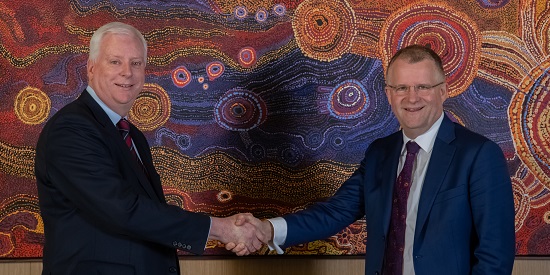Foundation to support Deakin's Indigenous and child health research
Media release
Deakin’s commitment to advance Indigenous outcomes has been given a significant boost thanks to a generous two-part gift from the Norman Beischer Medical Research Foundation.
Announced this morning at a joint signing with the Foundation’s Chief Executive Officer, Mr Andrew Brookes, and Deakin’s new Vice-Chancellor, Professor Iain Martin, the gift coincides with NAIDOC Week.
The gift will enable the Ernie Williams Indigenous Scholarship, to support two Indigenous students each year as they complete up to four years of study within the Faculty of Health each year from 2020 to 2023.
A further $92,000 research grant from the Foundation will co-fund a three-year project based at Barwon Health within the Faculty of Health to investigate how a mother’s gestational diabetes affects the bone health of her children.
Valued at $320,000 in total, the scholarship program honours the legacy of Ernest Daniel (Ernie) Williams, a key real estate advisor to the Foundation for many years before his passing in 2014.
Mr Brookes said the Foundation was inspired to contribute to Deakin’s work to support Indigenous outcomes because of the university’s reputation for providing a community-based learning model specifically designed for Aboriginal and Torres Strait Islander students.
“The scholarship program is a wonderful way to fulfil Ernie’s lasting wish to provide tangible support for the education of Indigenous students,” Mr Brookes said.
“We are delighted to be partnering with Deakin on these scholarships, especially as we know that the university provides such excellent support for Indigenous students through the Institute of Koorie Education.
“We hope that our scholarships will assist students to complete their studies and so be vital contributors to their communities.”
Deakin’s Chief Advancement Officer Jimmy Buck said the scholarship program would have wide-ranging benefits.
“Our hope is that, ultimately, the Ernie Williams Indigenous Scholarship program will help equip Indigenous health specialists with the tools they need to provide excellent and culturally-sensitive care to the communities they will serve,” Mr Buck said.
“And with Indigenous Australians continuing to experience much poorer health and wellbeing than the general Australian population, this kind of targeted support for the health practitioners of the future is very much welcomed and will absolutely change lives.”
The gestational diabetes research project will be led by Dr Natalie Hyde, Dean’s Research Post-Doctoral Fellow at the Epi-Centre for Healthy Ageing, within the School of Medicine.
Dr Hyde said the grant provided by the Foundation will support the purchase of essential equipment for the three-year study at University Hospital Geelong.
“We know from previous research that individuals with gestational diabetes have a higher bone density but, paradoxically, they have an increased risk of bone fractures,” Dr Hyde said.
“What we don’t know is the effect of gestational diabetes on bone health and fracture in the offspring.
“While some studies have focused on the effect on infants, we believe our study is the first to examine the association beyond infancy.
“If poor bone health is identified as a potential adverse outcome of gestational diabetes, this will allow for the development of effective monitoring and interventions for at-risk individuals and their children to prevent fracture in childhood and later life.
“Given that the direct cost of direct care for one hip fracture is upwards of $30,000, if we can prevent even a small percentage of these injuries, the potential savings for the health system are enormous.”
Share this story

